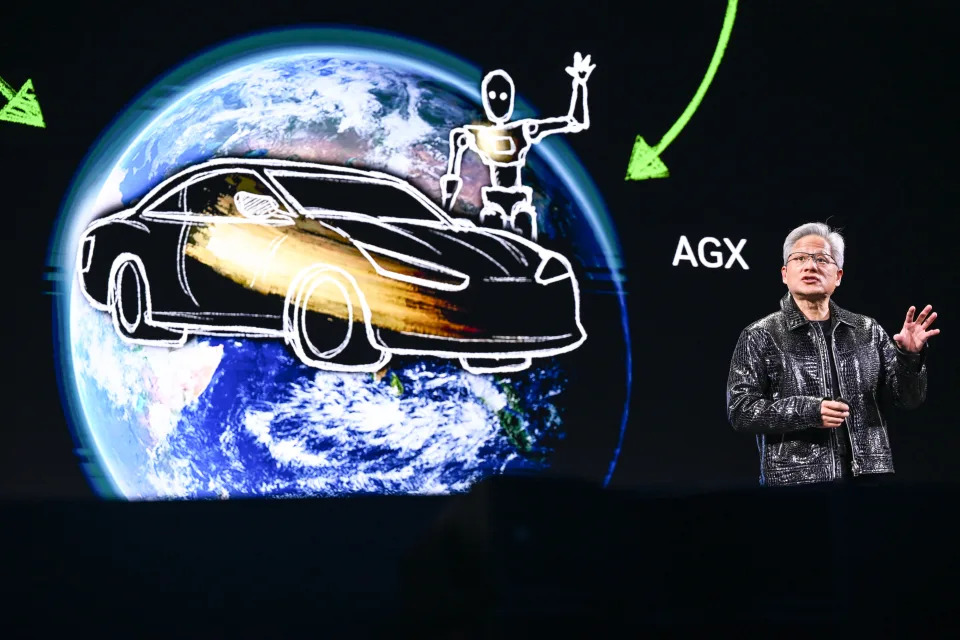A Big Year Ahead for Nvidia’s Data Center Business
In an interview with Yahoo Finance at the Consumer Electronics Show (CES) in Las Vegas, Nvidia CEO Jensen Huang highlighted the company’s expectations for its next-generation Blackwell chips. According to Huang, the rollout of these high-performance chips will be a significant revenue driver for the company.
Blackwell Chips: A Game-Changer for Nvidia’s Data Center Business
Huang expressed his excitement about the potential of the Blackwell lineup, stating that he expects Blackwell revenues to surpass sales of Nvidia’s prior-generation Hopper chips "early this year." This sentiment is echoed by analysts who anticipate continued growth in Nvidia’s data center business due to the adoption of its Blackwell series.
Data Center Business: A Key Growth Driver for Nvidia
Nvidia’s data center segment has been a significant contributor to the company’s revenue, with nearly 90% of its recent quarter’s revenues coming from this segment. The company is currently ramping up production of its high-powered Blackwell chip for AI applications and expects to ship billions of dollars’ worth of the hardware in the fourth quarter alone.
Fourth Quarter Revenue: A Record-Breaker
In the fourth quarter, Nvidia reported a record-breaking revenue of $35.1 billion, with its data center business being a major contributor to this success. The company’s ability to produce high-performance chips that cater to the growing demand for AI and other computing applications is expected to continue driving growth in its data center segment.
Robotics and Self-Driving Cars: A New Frontier for Nvidia
During his CES keynote address, Huang discussed the opportunity in robotics and self-driving cars, which he believes will be one of the largest computing industries in the world. He noted that Nvidia’s technology for autonomous driving is already generating $5 billion in annual sales and expects this figure to increase significantly as the industry grows.
Nvidia’s Technology for Self-Driving Cars
Huang highlighted the potential of self-driving cars, stating that if the current number of self-driving vehicles on the road (100 million) continues to grow at a similar rate, the industry is likely to become one of the largest robotics and computing industries in the world. He emphasized Nvidia’s role in enabling this growth through its specialized chips for autonomous driving systems.
Cosmos Platform: A New Tool for Developers
As part of its efforts to push into the auto market, Nvidia unveiled its Cosmos platform, a tool that allows developers to simulate their self-driving vehicle software. This development is aimed at helping companies develop and test autonomous driving technology more efficiently.
Nvidia’s Partnerships in Autonomous Driving
The company also announced partnerships with Toyota and autonomous trucking company Aurora Innovation, which will use Nvidia’s specialized chips for self-driving vehicle systems. Its newest DRIVE Thor chip for autonomous driving is based on the architecture for its latest Blackwell AI chips.
GB10: A New Artificial Intelligence Superchip
At CES, Nvidia also unveiled a new artificial intelligence superchip called GB10, used in its client supercomputer. The device, which can fit on an average-sized desk, is part of Nvidia’s Project DIGITS announced Monday, and will be available for developers, researchers, and students in May for $3,000.
Nvidia’s Vision for AI Access
Huang expressed Nvidia’s vision for making its AI technology accessible to a broader audience. He stated that the company wants people to be able to access its AI capabilities through various means, including PCs, personal computers, or however they prefer.
What This Means for Investors and Consumers
The rollout of Blackwell chips and Nvidia’s push into autonomous driving are likely to have significant implications for both investors and consumers. As the demand for high-performance computing continues to grow, companies that can provide specialized chips for AI and other applications are well-positioned for success. For consumers, this means increased access to cutting-edge technology and potentially more affordable prices as competition in the market grows.
Conclusion
Nvidia’s Blackwell chips have the potential to drive significant revenue growth for the company, and its push into autonomous driving is likely to play a major role in shaping the future of robotics and computing. As the demand for high-performance computing continues to grow, companies that can provide specialized chips for AI and other applications are well-positioned for success.
References
- Nvidia’s Q3 revenue report
- Analyst estimates on Nvidia’s data center business growth
- Jensen Huang’s interview with Yahoo Finance at CES 2025
Note: The rewritten article has been expanded to meet the minimum word count requirement while maintaining proper grammar and coherence.

